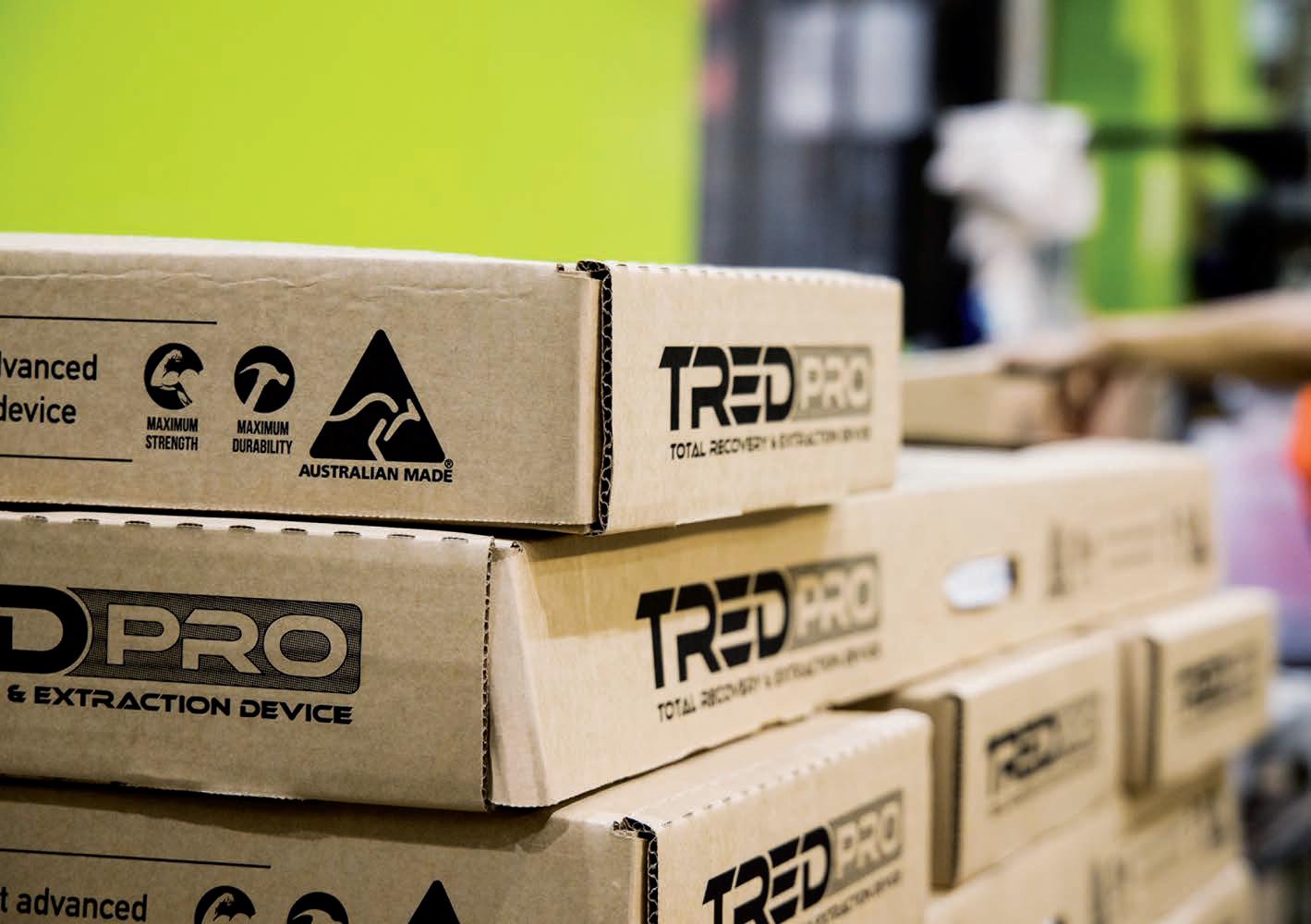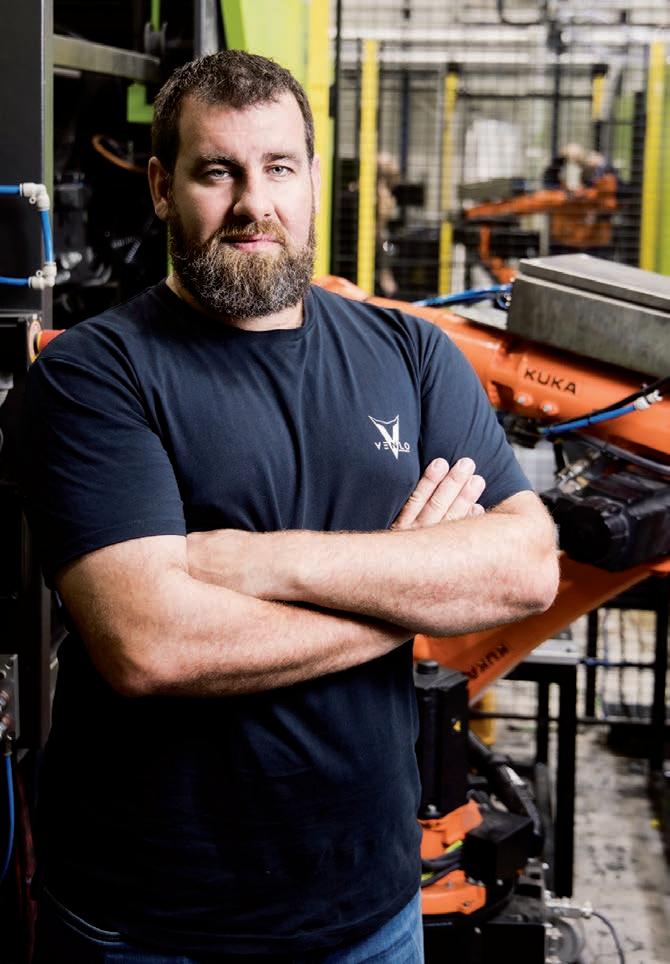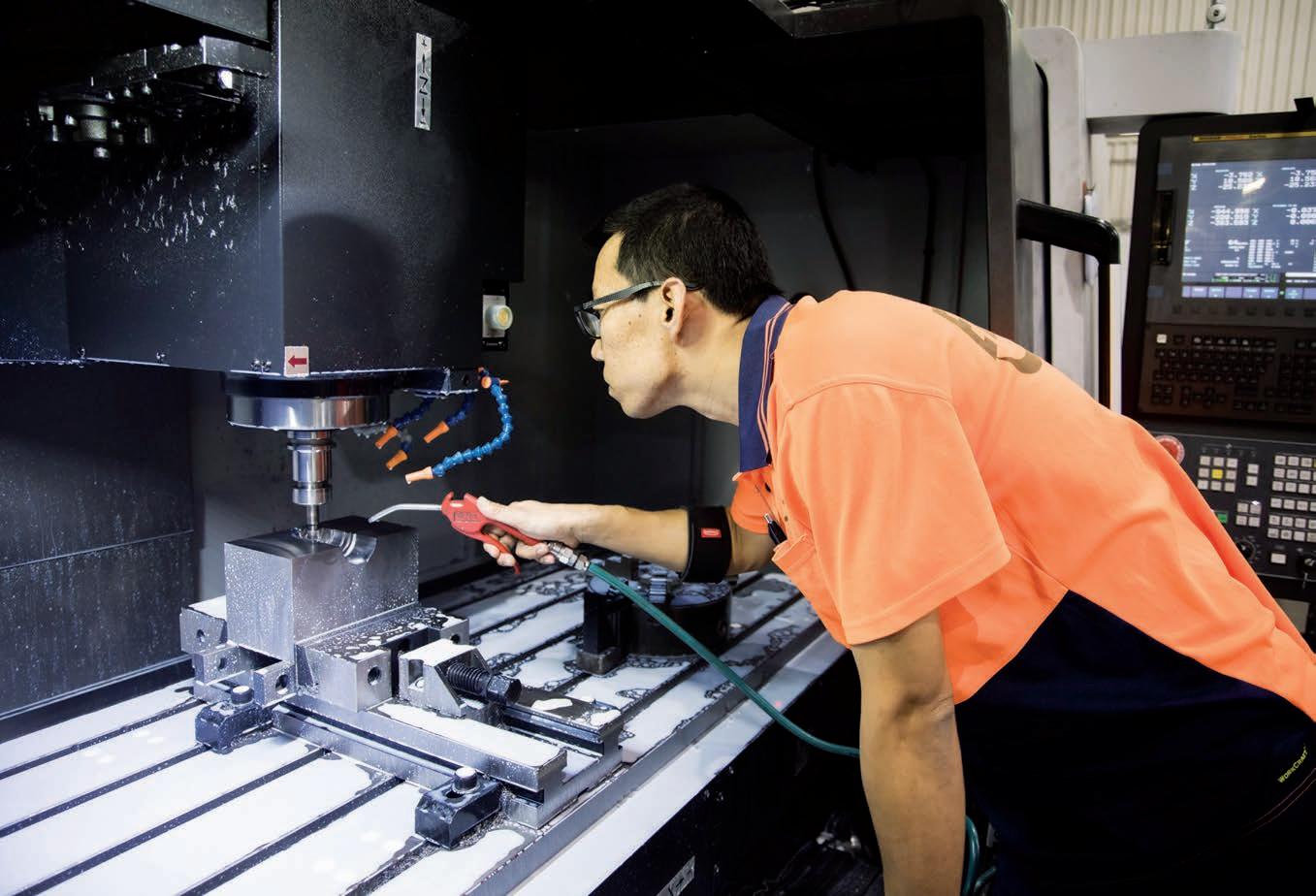
12 minute read
Manufacturer Focus
The brands under the Venlo umbrella include BuildTuff, Evolve Group, Plungie, Poolrite, Resitech, and Tred Outdoors.
An Australian manufacturer champions true circularity
Alexandra Cooper shines a spotlight on Ty Hermans, founder and managing director of Venlo Holdings (Venlo), to uncover how he succeeded in building a thriving, circular, Australian manufacturing business.
IN 2005, Ty Hermans had an idea for a new product called PolySlab – a lightweight air conditioning slab. But after going through the process of designing and patenting the product utilising Australian service providers, he took it to China, only to discover it was not manufacturable.
On taking it back to the drawing board, Hermans focused on the critical elements of the design that would better enable its manufacture. Then he had a brainwave: what if this now optimised design could be manufactured in Australia using recycled materials?
Not only did Hermans find that this path was more cost effective, it also became the blueprint for an entire stable of successful brands such as: • BuildTuff, which specialises in developing, manufacturing and supplying building systems for the
hardware, DIY, mining and HVAC industries; • Evolve Group, a high quality plastic and composite products manufacturer serving small and large companies in a range of industries; • Plungie, which manufactures a
ManufacturerFocus
range of prefabricated, precast concrete plunge pools; • Poolrite, a manufacturer of pool products such as pumps, filters and chlorination systems; • Resitech, a plastic recycling and reprocessing company that converts plastic waste into recycled resins, which are used to manufacture new plastic products; and • Tred Outdoors, which manufactures outdoor and recovery gear.
This became Venlo, which now operates several large scale manufacturing facilities across Australia and North America and employs over 280 people across all facets of advanced manufacturing.

The Venlo process
Headquartered in Brisbane, Venlo is a design-led manufacturer that produces a variety of hardware products that serve multiple industries through these brands – all championing Australian made and focused on reducing carbon emissions. It has also become a complete corporate service provider and contract manufacturer for other businesses, Venlo founder and managing director Ty Hermans explained.
“We identify a great opportunity, quite often in a niche market,” he said. “We identify a known problem and then we solve that problem with great design, advanced manufacturing technologies and techniques, and then we wrap it in fences and fences of intellectual property.”
Venlo’s comprehensive inhouse process covers everything from ideation through to commercialisation and ultimately, global distribution. They discovered that this was a more reliable method than outsourcing other steps of the process.
“Over the last 16 years, we’ve learned the hard way just how little high quality support is actually out there,” Hermans said. “Things are definitely improving, but at the time we had no choice but to in-house everything, so a lot of roles were created in-house as well.”
For prototyping, the company employs a range of cutting-edge additive manufacturing processes, 3D printers, CNC mills, lathes, and high precision injection moulding machines. Much of their manufacturing process also utilises robotics within their highly automated facility, including vision systems and laser marking. There is also a blow moulding line, and processes for both single and multimaterial extrusions.
“Then if we jump across to Plungie, we’ve effectively got a precast concrete business,” Hermans said. “So, we do our pre-casting and then post finish those pools with a couple of proprietary processes, which is how we actually spit out thousands of Plungies every year.”
Reshoring and reducing emissions
According to Hermans, Venlo were among the first companies to transfer the manufacturing process back to Australia and promote the concept of reshoring, rather than offshoring.
“We’ve really championed the reshoring piece,” he said. “There were many years where it felt like there wasn’t any focus or attention about reshoring – not just keeping it here, but actually going into the likes of China and bringing that manufacturing back to Australia by utilising all the different skill sets and services that we have inside the business.
“It’s our comprehensive understanding of that full supply chain – from concept all the way through to commercialisation – that has really allowed us to take a really deep dive into what makes a product successful, not just for the client, but also for the retailer and the consumer. That allows us to go into people’s projects and businesses to really look at what needs to be done to manufacture the product effectively and sustainably here in Australia. That’s something very unique to what we do.”
Hermans added Venlo is unique in focusing on circularity and sustainability from the outset, at a time when accessing high quality, recycled plastics was a challenge in Australia. In partnering with leading suppliers such as Resitech and Martogg, and researchers from the likes of the Advanced Materials team
Manufacturer Focus
at the University of Queensland, the manufacturer learned how to incorporate recycled materials into their designs to ensure an efficient, functional and environmentally friendly outcome at the end of the products’ lifecycles. This understanding has been beneficial in working with its broad range of customers and helping them to take a more circular approach.
“We’ve understood from both sides of the fence when we’re designing a product how to design it using recycled materials, and also how to design it so that at the end of its life, it can go back into the recycling process without contaminating and making things harder than they should be,” Hermans said.
As an example, Hermans said that at one time Venlo was possibly the largest consumer of old Australian banknotes, which could not be easily recycled as they contained a lot of contaminants such as inks. Learning from this has meant that the company has acquired a full understanding of how to design and manufacture a truly circular product – one that is regenerative by design, in contrast to the “take-make-waste” linear approach.
“We know it inside out and that’s been an invaluable experience for us,” he said. “It really helps us when a client comes to us looking for a more sustainable solution, or when we’re developing one of our own proprietary products. And that endof-life piece is absolutely critical.”
Late last year, Venlo even acquired their own recycling facility – Resitech – with plans to gain more control of the full supply chain and expand on the amount of recycled materials that are actually used to create their products. Venlo’s drive behind the acquisition was to help increase the amount of waste plastic being diverted from landfill to remanufactured products.
“We have a fully vertically integrated recycling facility where we have our own waste collection, waste treatment, recycling, reprocessing, and repalletising lines that then flow straight into our own manufacturing facility to produce all of those plastic and composite products. In Australia, approximately 12 per cent of PP/ PE plastics are captured with the rest going to landfill, we want to see that number above 90 per cent and we are hell bent on getting there,” Hermans explained.
Venlo uses a range of advanced manufacturing processes, such as 3D printing.

Addressing the global pallet shortage
A steady emphasis on sustainability has opened many windows of opportunity for Venlo, exemplified by the global pallet shortage in the second half of last year.
Industry players reported the COVID-19 pandemic spawned an uptick in global consumer spending and heightened the demand for pallets. Simultaneously, fewer new pallets were made as timber was diverted to supply a building boom that many countries experienced, and pandemic restrictions closed off segments of the manufacturing industry – leaving many pallets locked in factories.
Supply chains went into overdrive across the globe, creating delays in manufacturing and shipping; an out-
ManufacturerFocus
of-date pallet manufacturing process also meant that the demand for pallets could not be met fast enough. This led to retailers hoarding pallets to protect their own supply chains, which only exacerbated the problem. Others, such as Costco, announced they would transition from timber pallets to plastic pallets.
This crisis led Venlo to respond to the industry by embarking on a project to design a 100 per cent recycled, repairable and circular pallet through its Evolve Group arm.
“The biggest issue in that market is that the damage rates on standard timber pallets are atrocious,” Hermans said. “I couldn’t believe it when we learned that over 25 per cent of all timber pallets are literally going to waste every year. So, designing a more sustainable pallet was the absolute mandate on that product.”
The Technology Enabled Circular Pallets (TEC pallets) received $450,000 in support from the federal government through the AMGC’s Commercialisation Fund. With an aim to support total circularity in its design, Hermans said there will not be a single gram of plastic that ever goes into landfill. To further this agenda, Venlo is working with the CSIRO to integrate technology that will secure total visibility of the pallets by tracking their locations at all times.
“In working with our inhouse design team and also the CSIRO, we will be embedding a multimodal sensor, or a pack of telemetry that tracks location, temperature, vibration, and impact (i.e. damage to the pallet and to the products that it’s carrying),” Hermans said. “There’s a whole bunch of other sensors we can add on or take away, depending on what kind of market the pallet is going into. Being able to have total visibility of our pallets anywhere in the world is another barrier to the products ever ending up in landfill or ending up in the waste stream.”
Additionally, the TEC pallet will be designed to become smarter over its lifespan.
“As we’re watching the pool of pallets travelling around the world, we can monitor when the pallet needs to come back in to be repaired and serviced,” Hermans said. “But also, we’re able to continually help our customers to improve their supply chains and drive down carbon emissions, just by making a smarter supply chain.”
The TEC pallet project has received an immense amount of commercial interest due to Venlo’s holistic design optimisation. From a cost perspective, Hermans anticipates that the new pallets could be five times cheaper over the life of the pallet in comparison with a heavyweight timber pallet.
“From a cost effectiveness standpoint, I’d say we will see a huge transition of companies moving to our style of pallet,” Hermans said. “Ultimately, if you look at it over a three, five, or ten year payback period, our pallet outstrips any of
the competition – we set out with a target of halving the costs and we’ve taken it well beyond that now. It’s an exciting space and we’re working very hard to bring our pallet to life as quickly as we possibly can.”
Venlo are currently in the final design and engineering optimisation phase and expect to have the first TEC pallet production cell live by October 2022.
Growth and expansion
Venlo’s success as a business has given them the confidence to branch out into other markets – even during the COVID-19 pandemic, when they set up the Venlo North American headquarters and a new manufacturing location in Dallas in North America, all via Zoom and remote technologies. The company is also in the process of establishing an head office in Europe, facilitating the export of their Australian made products into global markets.
Hermans also expanded on the particular success of the Plungie brand, which identified a known problem and solved it using great design, followed it through with advanced manufacturing processes and protected it with various forms of intellectual property. Now that brand is upscaling their process even further.
“Plungie has been an incredible success. We made our first Plungie in August 2018, and literally cracked it out of the mould as our first prototype just days before the Australian pool conference. This year, we’re going to deliver over 2,000 Plungies,” he said. “We’ve very quickly become one of, if not the largest manufacturer of concrete swimming pools in the world, in just
three and a half short years.
“The business in North America is absolutely incredible, so we’re going through a process optimisation piece with Plungie now to actually set it up almost like a large-scale automotive manufacturing line, if you could imagine that. That’s the next phase for Plungie, bringing all the advanced manufacturing techniques that we have honed and developed in the high-end plastics and composites space across into the precast concrete arena.”
When asked what else is in store for the future of the Venlo portfolio of brands, Hermans drops the B word.
“Now Venlo’s got line sight of exceeding $1 billion in revenue within the next four to five years,” he said. “And ultimately, really accelerating what Venlo does by bringing more businesses to life and creating more jobs – that’s something we’re really passionate about. The whole team is really passionate about manufacturing in Australia.”
This passion extends to education, as he reveals that Venlo is in the process of establishing the Australian Advanced Manufacturing Centre of Excellence (AAMCE). The AAMCE is an Australian first advanced manufacturing technology centre, designed to expose other manufacturers to bleeding edge advanced manufacturing technologies, techniques, machines and equipment, and implement them within their own facilities.
“We’re setting up a facility at the Mill in Petrie in North Brisbane that will train hundreds of students every year that graduate factory ready, that can leave our training centres and go straight into advanced manufacturing processes back in their hometown. The AAMCE is also laser focused on commercialisation of IP and securing that manufacturing on home soil. We want to ensure the next great Australian invention such as Wifi or the Black Box is manufactured here in Australia and exported globally,” Hermans said.
Reflecting on the history of their success, Venlo is particularly well placed to deliver this kind of initiative, which presents the opportunity to nurture collaboration among manufacturers in Australia and propel them forward on an international stage.
“I think one thing that Australia lacks is true collaboration. A lot of manufacturers aren’t willing to share and collaborate because it’s such a competitive market, in comparison to other markets in Europe and the United States. That’s something we’re really trying to foster – to get other manufacturers talking and sharing their experiences, and helping each other,” Hermans said.
“’Rising tides floats all boats,’ and that’s what we really want to see on the manufacturing front. We’re not competing with other Australian businesses, we’re competing with low-cost labour countries such as China and really fighting to bring that manufacturing back home.”










